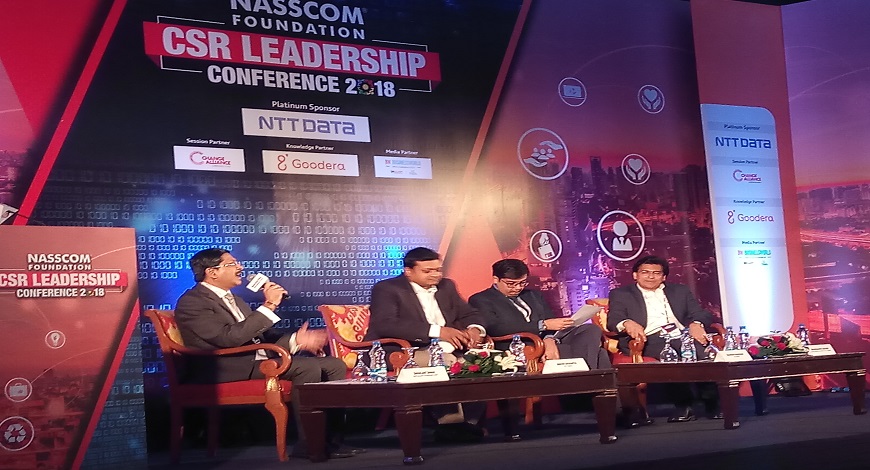“I don’t even think the environment is one of the mainstream issues right now, I don’t think it forms a significant part of CSR strategies. From a CSR perspective, what is happening is companies are investing in long-term projects, so the impact is not seen soon,” said Raghuvansh Saxena, CEO, Earthwatch
On 14th March, at the CSR Leadership Conference 2018 organized by NASSCOM Foundation, there was a panel discussion on ‘Making CSR count in Combating Environmental Challenges of the Country’, where the panel discussion took place on the scope for CSR interventions to create positive environmental change. The session was moderated by Shrikant Sinha, CEO, NASSCOM Foundation, who began by saying, “Today if we look at it, 13 of the 20 most polluted countries are in India. There are 1 billion plus mobile phones in India, which means 1 billion chargers. That means there are 30,000 tons of e-waste. The environment we want to leave for our future does not paint a nice picture. It’s interesting that people invest on green bonds but won’t segregate their waste.”
Sinha also went on to add, “If you want someone to do something, we must make them believe in. Most of the companies have no environmental factor on the CSR side”. Ankur Dasgupta, Vice President, Marketing, NTT DATA, said, “We all believe in the law of karma, which works fair for the environment. We owe it to our grandchildren that we leave them a better future. In the IT industry, while everything is about knowledge, there is a huge carbon footprint. We have been looking at the carbon footprint by us, and to reduce it, we need to keep it mind it cannot affect clients. We have done a 20% reduction in waste”. He also added, “A lot of what we face in Bangalore makes us feel helpless as it seems that superhuman ability is required to change Bangalore for the better. NTT DATA does something called Global Volunteer Week where we encourage volunteers to work for their community. We need to figure out what we want to do that leaves an impact”
Dasgupta also added, “When we think of our employees, and we think of the environment, taking them out to do something outside for the environment is of their interest, and it is good for employee engagement. At NTT DATA, we have also digitized the pope’s library in Vatican”.
Chandan Bhavnani, Executive Vice President, Responsible Banking, YES Bank, said, “I think at Yes Bank, we believe that the environment is not something of the future, but it is happening right now. Look at what has been happening around the world, we have had massive economic losses due to climate change. It’s about working from today for each of us. The government has been working hard, for example, the Swachh Bharat Mission. It’s also about how we fuel a circular economy and how we recycle our waste. It’s time to look at the e-waste generated and look at it as a new mining resource. We have got a very robust environmental management system for internal stakeholders. For external stakeholders, we have a CSR focused on environmental sustainability, we are planting a lot of trees. We are working with 3200 MSMEs to make them more energy efficient. We are working with Assam and Rajasthan to preserve their biodiversity. We are doing an annual Natural Capital Awards, where there is recognition of those in the financial sector. We came out with green investment bonds in India”. He also went on to add, “A section of organizations may look at CSR and sustainability as a risk mitigation thing, the way they interact with communities, for some it’s about creating shared value. It’s for adopting innovating impact and scale approach for CSR. CSR should be intentional, not conventional. There has to be impact and scale to it. It’s about building an ecosystem. CSR has to be at the core, a cross-cutting platform across all divisions, it has to be mainstream.”
“I don’t even think the environment is one of the mainstream issues right now, I don’t think it forms a significant part of CSR strategies. From a CSR perspective, what is happening is companies are investing in long-term projects, so the impact is not seen soon. YES Bank has environment and sustainability as a top of the priority. A lot of businesses are looking at CSR to create shared value”, said Bhavnani. Raghuvansh Saxena, CEO, Earthwatch Institute India, said, “The focus is on collaborative efforts to bring multiple stakeholders today for the environment. We are also on something called experiential learning, through which we propagate environmental safety. Many corporations have come to us and told us that they want to build human capital which is knowledgeable about issues of climate change and forest conversation. So it is important to train the young force in the green sector. The key here is how we bring together the interests of stakeholders like scientists, corporations, government and so on”. “Some organizations look at CSR as a part of their large business strategy, and they are proactive. We are lucky to be working with a few of these organizations, which makes our job easier. Some of the corporates really don’t know how to incorporate environment as a part of their larger thinking”, said Saxena.
Article Source: Business World

